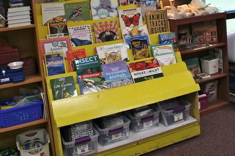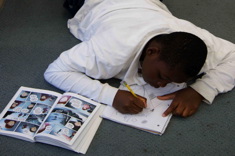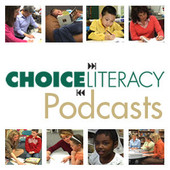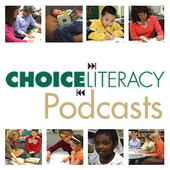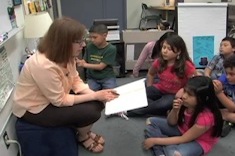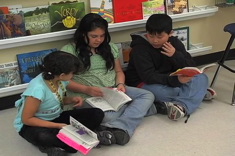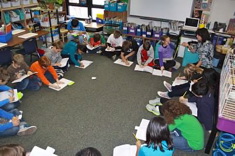Library
Choice Literacy Articles & Videos
The Choice Literacy library contains over 3,000 articles and 900 videos from 150+ contributors. Classic Classroom and Literacy Leadership subscribers have access to the entire library. Content is updated continuously, with five to six new features published each week.
Latest Content
Fact of the Day
Do you have fact hunters in your room? Andrea Smith legitimizes and celebrates these collectors and brings a new level of nonfiction awareness to her classroom.
Communicating with the Y Chromosome
Heather Rader finds herself coaching a male teacher who is part of a male teaching team, and gets a lesson herself in gender communication patterns.
Mentor Texts for a Writing Study in Graphica
Graphica readers often want to become graphica writers. Franki Sibberson weeds through the books and leaves us with the "good stuff" for mentor texts.
Common Core Conversations: Reading in the Disciplines
Amanda Adrian and Heather Rader look at reading across the disciplines within the Common Core.
Katherine Casey on Sharing Blunders with Colleagues (PODCAST)
Katherine Casey explains why she shares her teaching blunders (on video, no less) with colleagues, and what she has learned from the process.
Invocation at the End of Summer
Shirl McPhillips reminds us of the power of an invocation–a call for support. Not only is this a beautiful poem, but it is a model for students writing their own invocation.
Skype an Author with Kate Messner (PODCAST)
In this podcast, Kate Messner points out the cost and kid benefits for skyping with an author.
Pitching My Lesson Plans for a Day of Peace and Poetry
Seizing an unexpected learning opportunity may be the best way to remember why you became a teacher in the first place. Karen Terlecky celebrates one of these serendipitous moments.
The Superpower of Reflecting
Are you more of a Pollyanna or Eeyore reflector? Heather Rader takes you inside the questions that help us reflect even more deeply on our instructional practices.
Improving Poetry’s Rap
Katie Baydo-Reed finds the web has great resources for her middle school students when it comes to sparking more interest in poetry.
Current and Cocoa: Mixing Social Studies and Literacy
Current and Cocoa is a fun routine for integrating social studies, literacy, and conversation in classrooms. Heather Rader describes how the weekly activity builds community and fosters awareness of news events.
Conferring with Parents (ROUND-UP)
There is always a new tweak to consider with conferences involving families. Choice Literacy Contributors have both the head and heart in mind with these tips.
Trying to Coach Without the Budget in Mind
Melanie Quinn makes a somewhat surprising discovery in the midst of the budget cutting season. The best way to justify her literacy coaching position is to do less – but do everything extraordinarily well.
Wild Facts
Wild Facts is a terrific example of how Andrea Smith's intermediate students naturally connect web resources with content learning.
Sorting Students for Flexible Groups Across Classrooms
Jennifer Jones explains how one team of second-grade teachers formed guided reading groups across classrooms to marshal resources and expand their collaboration.
Learning from Master Teachers: Final Lessons in the Cycle (Part II)
Franki Sibberson presents two more minilessons from her cycle on teaching students how to respond to reading.
Not That Into Me
If you're a literacy coach, those teachers who don't want to work with you can make you feel like the wallflower at the prom or the last kid picked for the basketball team. Heather Rader has positive, proactive suggestions for making the best of an awkward situation.
Updating Reading Interviews: Technology and Changing Habits
Reading Interviews are a staple in many literacy programs – a terrific tool for learning more about the history and habits of students. Franki Sibberson explains how she has updated her reading interview to include questions about digital resources and tools.
5 Easy Steps to Becoming Active in the Blog Community
If you are beginning to involve yourself more in online networks, you might enjoy these suggestions from Mary Lee Hahn and Franki Sibberson.
The Amazing School Librarian: An Interview with John Schumacher (PODCAST)
Franki Sibberson interviews extraordinary school librarian and blogger John Schumacher in an inspiring podcast that will get you thinking in new ways about school librarians and their role in your learning community.
Lady With the Yellow Umbrella
In this poem, Shirl McPhillips writes about "learning better how to live" while finding peace and purpose in the midst of adversity.
Books Struggling Readers Can and Will Want to Read: Building the Classroom Library
Sammy is an avid reader in the classroom, but his teacher Cathy Mere notices he “accidentally” is always leaving the backpack with his intervention books behind. The challenge for classroom teachers is stocking books with titles that will interest Sammy, but still provide enough challenge and support to move him forward as a reader.
Common Core Conversations: The Half ‘n’ Half Shift for Nonfiction Reading and Writing
Colleagues and coaches, Amanda Adrian and Heather Rader, explore the upcoming shifts in English Language Arts and anticipate what it will mean for leaders, teachers and most importantly, students.
Graphic Organizer for Mystery Writing
Beth Lawson talks with her 4th graders about the elements of a good mystery, and shares a graphic organizer to help them develop realistic characters and themes.
Getting Started With Twitter
Intrigue, frustration, instruction at the point of need…Franki Sibberson cycles through many common learning stages as she builds Twitter into her daily routine.
Tuesday Trades: A New Literacy Ritual in My Classroom
Tuesday Trades are a terrific way to increase peer book recommendations. Andrea Smith created this new weekly activity with her intermediate students, building on existing workshop routines.
Books, Books, Books
Parents of young children may be drawn to text tied to movies or other pop culture filler books. Trish Prentice shares a letter she sends home to families to encourage even the youngest learners to find books and authors with a little more staying power.
Great Lead Investigators
Katie Doherty turns her middle school students into lead investigators – an activity that is a terrific combination of mentor texts, group work, and connections to student writing.
Letting Go After Holding on Tight: Reflecting on the Last Days of School
Andrea Smith writes about how our instincts as parents and teachers merge to make it so hard to say goodbye at the end of the school year.
Kelly Gallagher on Readicide (PODCAST)
High school teacher and best-selling author Kelly Gallagher talks about "readicide" – what teachers and schools do to systematically kill a love of reading in students.
Browse Content By
Type
Category
- Assessment Tools
- Big Fresh Archives
- Booklists
- Choice Numeracy
- Classroom Design
- Common Core
- Community Building
- Conferring
- Content Literacy
- Digital Literacy
- English Language Learners
- Equity
- Family Relations
- Free Samples
- Guiding Groups
- Leadership
- Literacy Coaches
- Mentor Texts
- Minilessons
- New Teacher Mentors
- Podcasts
- Poetry
- Quote Collections
- Reading Strategies
- Self Care
- Struggling and Striving Learners
- Talking and Listening
- Teacher Study Groups
- Teaching Reading
- Teaching Writing
- Word Study and Vocabulary
Author
- Melissa Quimby
- Nawal Qarooni
- Gwen Blumberg
- Julie Cox
- The Lead Learners
- Hannah Tills
- Josie Stewart
- Ruth Metcalfe
- Mallory Messenger
- Becca Burk
- Jodie Bailey
- Vivian Chen
- Mary Brower
- Tiffany Abbott Fuller
- Stephanie Affinito
- Ruth Ayres
- Leigh Anne Eck
- Heather Fisher
- Shari Frost
- Julie Johnson
- Suzy Kaback
- Gigi McAllister
- Shirl McPhillips
- Melanie Meehan
- Cathy Mere
- Debbie Miller
- Tara Barnett and Kate Mills
- Tammy Mulligan
- Dana Murphy
- Bitsy Parks
- David Pittman
- Brenda Power
- Heather Rader
- Matt Renwick
- Mandy Robek
- Christy Rush-Levine
- Gretchen Schroeder
- Jen Schwanke
- Brian Sepe
- Katherine Sokolowski
- Stella Villalba
- Jennifer Vincent
Grade Level
Choice Literacy Membership
Articles
Get full access to all Choice Literacy article content
Videos
Get full access to all Choice Literacy video content
Courses
Access Choice Literacy course curriculum and training

